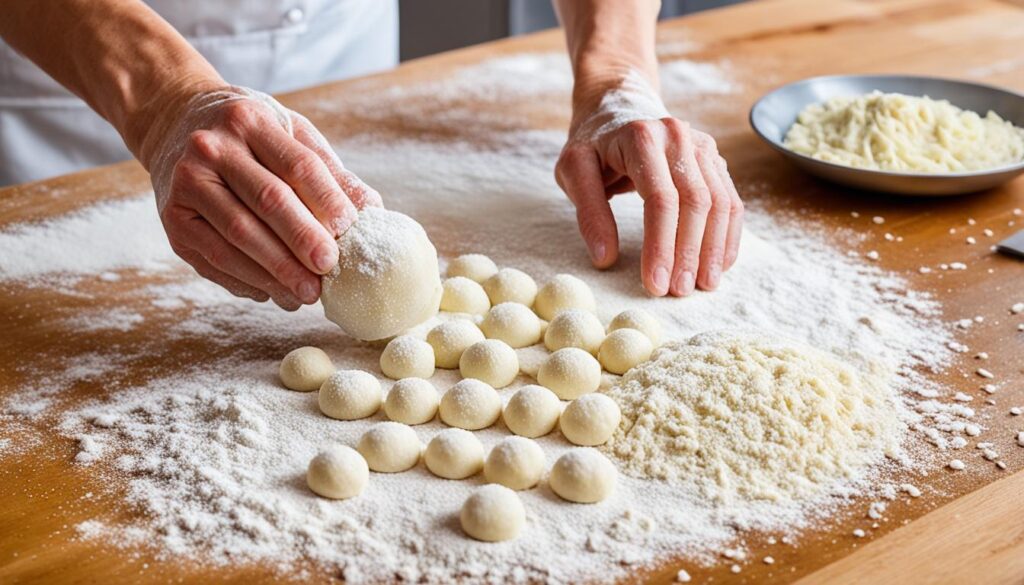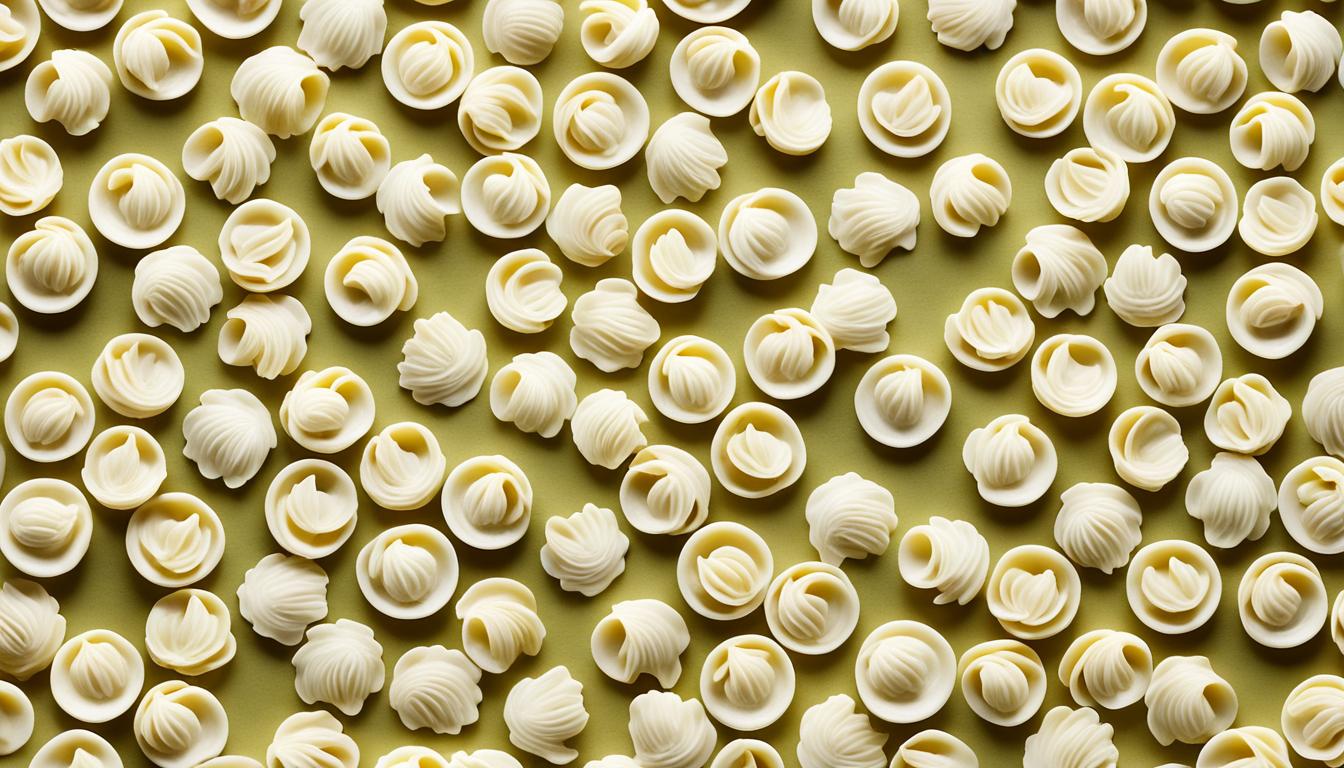Ever wondered why some pasta shapes have deep meanings? “Orecchiette,” meaning “little ears” in English, looks just like tiny ears. This pasta comes from Southern Italy’s Apulia region. It’s a key part of Italian food, great at holding onto rich sauces.
As orecchiette becomes more popular, it’s important to know what it means and its role in cooking. This knowledge is useful for both home cooks and professional chefs.
Key Takeaways
- The word “orecchiette” means “little ears” in English.
- Orecchiette pasta originates from the Apulia region of Italy.
- This pasta shape is ideal for holding rich sauces.
- Understanding orecchiette enhances knowledge of Italian cuisine.
- Orecchiette is both popular in traditional and modern recipes.
Understanding Orecchiette Pasta
Orecchiette is a special type of pasta known for its small, ear-shaped disks. It’s perfect for holding onto sauces, making meals more enjoyable. Chefs love it for its ability to mix well with strong flavors and different textures.
Definition and Characteristics of Orecchiette
Orecchiette is made from durum wheat semolina and water, giving it a chewy texture. Its shape is great for catching ingredients, especially in hearty sauces. It comes from the Apulia region of Italy, adding a rustic touch to Italian dishes.
How Orecchiette Differs from Other Pasta Shapes
Orecchiette stands out from other pasta because of its unique shape. Unlike long, flat spaghetti or fettuccine, it’s a vessel for sauce. This lets it hold ingredients better, making each bite a perfect mix of pasta and sauce.
What Does Orecchiette Mean in English?
Orecchiette is a type of pasta known for its unique ear-like shape. It’s a key ingredient in many traditional Italian dishes. Knowing what orecchiette means can deepen your love for this beloved pasta.
Literal Translation and Etymology
The word etymology of orecchiette comes from “orecchia,” which means “ear” in Italian. This name points out the pasta’s look, which is like small ears. So, orecchiette’s name ties it to Italian culture and its distinct shape.
Significance of the Name in Italian Cuisine
Orecchiette is more than just a pasta shape. It’s a symbol of authentic cooking from the Apulia region. The name connects it to a deep culinary tradition. It’s often found in classic dishes, highlighting its role in celebrating Apulian recipes.
| Aspect | Description |
|---|---|
| Literal Meaning | Derived from “orecchia,” meaning “ear” |
| Etymology | Reflects the pasta’s unique shape |
| Cultural Significance | Symbol of Apulian heritage and authenticity |
| Traditional Uses | Commonly used in regional dishes |
History of Orecchiette
Orecchiette’s history is as rich as its taste. This unique pasta shape comes from Apulia, a region in southeastern Italy. It’s known for its food traditions. The small, ear-shaped pasta has been a key part of Italian meals for centuries.
It’s often linked to the rural communities that love it.
Origins in the Apulia Region of Italy
Orecchiette dates back to the 12th century. It started as a food for peasants. Made by hand, it became a main part of the diet in Apulia. It used local grains and fresh ingredients.
Its shape was perfect for soaking up sauces. This made it a favorite in many traditional dishes.
Evolution of Orecchiette Throughout the Years
Orecchiette’s story shows how pasta has changed in Italian cooking. It moved from home cooking to fancy restaurants. Now, it’s a mix of old traditions and new gourmet tastes.
Recipes from different regions show how versatile orecchiette is. It’s become a star in Italian restaurants worldwide.
| Time Period | Significance | Key Characteristics |
|---|---|---|
| 12th Century | Origins in Apulia | Handmade, essential for peasants |
| 20th Century | Regional and Culinary Recognition | Adoption in higher-end cuisine |
| Present Day | Global Popularity | Iconic, versatile pasta in Italy and abroad |
Orecchiette and Italian Cuisine
Orecchiette is a key part of traditional Italian dishes, especially in Southern Italy. It’s a unique pasta shape that absorbs sauces well. This makes it a versatile ingredient in Italian cooking.
Placement in Traditional Italian Dishes
Orecchiette’s shape is ideal for holding onto flavors. It’s often paired with vegetables and meats in traditional dishes. For example, orecchiette con cime di rapa with broccoli rabe and Italian sausage is a favorite. This dish shows how orecchiette is vital in regional cooking.
Popular Orecchiette Recipes
Many people love making orecchiette with different ingredients. These dishes are often full of flavor. Some top recipes include:
- Orecchiette with Tomato and Basil
- Orecchiette with Pesto and Cherry Tomatoes
- Orecchiette in Creamy Mushroom Sauce
- Orecchiette with Meatballs
- Orecchiette with Spinach and Ricotta
These recipes show how orecchiette can mix well with many flavors. To learn more, check out popular orecchiette recipes.
Orecchiette plays a big role in Italian cuisine. It keeps evolving but stays true to its roots.
Orecchiette: A Pasta for Every Occasion
Orecchiette is a versatile pasta that fits well in many dishes. Its shape is perfect for holding onto flavors, making it great with many sauces. You can pair it with classic tomato sauces, creamy sauces, or vibrant pestos. This makes it perfect for any event, from a cozy family dinner to a big party.
Best Sauce Pairings for Orecchiette
Here are some top sauce choices for orecchiette:
- Tangy tomato sauce with herbs
- Creamy Alfredo sauce with mushrooms
- Pesto made from fresh basil and pine nuts
- Rich ragù, particularly with lamb or beef
- Simple garlic and olive oil for a light touch
Serving Suggestions for Special Occasions
To make orecchiette special for big events, add some fancy touches. Here are some ideas:
- Orecchiette with creamy pancetta and peas, garnished with parmesan.
- Orecchiette paired with a luxurious lamb ragù, topped with fresh herbs.
- Orecchiette served in a light broth with seasonal vegetables for a refreshing twist.
- Orecchiette baked with cheese and a sprinkle of breadcrumbs for a comforting dish.
Making Orecchiette at Home
Making orecchiette at home brings a taste of Italy into your kitchen. This traditional pasta is known for its unique shape. It offers a delightful experience that connects you to Italian culinary heritage. To start making homemade orecchiette, you’ll need a few simple ingredients.
Ingredients Required for Homemade Orecchiette
The key ingredients for orecchiette are:
- Durum wheat semolina
- Water
These ingredients show the simplicity and elegance of this pasta. Once you have them, the fun starts in the kitchen.
Step-by-Step Guide to Crafting Orecchiette
This guide makes making homemade orecchiette easy:
- Mix durum wheat semolina and water to create a smooth dough.
- Knead the dough until it’s elastic and soft.
- Roll the dough into thin ropes and cut them into small pieces.
- Shape each piece into the characteristic ear shape with a knife or a similar tool.
Learning to make homemade orecchiette will improve your cooking skills. It will also deepen your appreciation for this beloved pasta. For a more detailed step-by-step guide, exploring various techniques can make this experience even more rewarding.

Common Dishes Featuring Orecchiette
Orecchiette pasta is a star in many dishes, especially in classic Apulian recipes. These recipes use ingredients from the Apulia region. The pasta’s shape is perfect for holding onto sauces, making meals more enjoyable. Simple ingredients with orecchiette create a tasty mix loved by food lovers.
Classic Dishes from Apulian Cuisine
Some top dishes with orecchiette are:
- Orecchiette alle cime di rapa: This dish pairs orecchiette with broccoli rabe, anchovies, garlic, and chili flakes.
- Orecchiette con sugo di pomodoro: It’s a simple yet tasty dish with fresh tomato sauce, basil, and olive oil.
- Orecchiette al forno: This version is baked with cheese and meat sauce, making it a hearty option.
Modern Twists on Orecchiette Recipes
Today, chefs are adding new flavors to orecchiette, mixing old and new. These new takes often combine traditional tastes with modern cooking methods. Some examples are:
- Orecchiette with sautéed pumpkin and sage: This dish uses roasted pumpkin and sage leaves for a seasonal twist.
- Orecchiette primavera: It’s a fresh dish with a mix of spring vegetables.
- Spicy orecchiette with chorizo: This version adds a spicy kick to the classic pasta.
These classic and modern orecchiette dishes show how versatile the pasta is. It can fit into many cooking styles while keeping its rich history.
Why Choose Orecchiette?
Orecchiette is a standout pasta type because of its unique shape and great taste. It’s more than just a pretty face. It also offers textural and nutritional benefits that make meals better.
Textural and Flavor Benefits
Orecchiette’s shape is like little ears, perfect for holding onto sauces and ingredients. This makes every bite a mix of flavors. It’s great with rich sauces and pairs well with veggies, meats, and bold sauces.
The chewy texture adds to the fun of eating it. It’s a joy to eat, making meals more enjoyable.
Nutrition Benefits of Orecchiette Pasta
Orecchiette is mostly made from durum wheat semolina. This gives it a lot of fiber, which is good for your health. Eating orecchiette can help you stay full and healthy.
It’s a filling dish that’s also good for you. When you add fresh veggies and lean meats, it becomes a meal that’s good for your body.
Where to Find Orecchiette
Orecchiette comes in fresh and dried forms, meeting different cooking needs. Knowing where to look makes shopping easier. Local markets are a great place to find unique pasta types.
Shopping for Fresh and Dried Orecchiette
You can find fresh orecchiette at Italian specialty markets and some grocery stores. It tastes and feels better than dried types. Dried orecchiette is available at big stores or online. Always check the packaging and expiration dates to ensure quality.
Recommendations for Specialty Markets and Online Stores
For top choices, visit Italian delis and specialty markets known for pasta. Online stores focused on Italian gourmet ingredients also offer many dried orecchiette brands. Sites like Eataly and Amazon make it easy to shop for orecchiette from home.

Substitutes for Orecchiette
If you can’t find orecchiette, there are other pasta shapes you can use. It’s important to think about the dish you’re making. Each type of pasta has its own special qualities that make it great for certain recipes.
Alternative Pasta Shapes That Work Well
There are several pasta shapes that can replace orecchiette. They’re good at holding onto sauces and working well with different ingredients.
- Penne: This type of pasta is great for baked dishes. It has a strong structure that holds up well with rich sauces.
- Fusilli: Fusilli’s spiral shape is perfect for dishes that need a sticky or creamy sauce. It catches the sauce beautifully.
- Farfalle: Farfalle, also known as bow-tie pasta, looks nice and tastes great. It goes well with both light and thick sauces.
When to Use Substitutions in Recipes
Substituting pasta shapes can make cooking more fun and creative. Here are some tips for choosing the right substitute:
- Texture: Pick a shape that feels similar to orecchiette for the best mouthfeel.
- Sauce Compatibility: Make sure the pasta can hold onto the sauce or other ingredients well.
- Cooking Time: Make sure to cook the pasta until it’s just right for your dish.
Knowing these tips will help you pick the best substitute pasta shapes. This way, you can make delicious Italian dishes even when you don’t have orecchiette.
| Substitute | Best Use | Texture |
|---|---|---|
| Penne | Baked dishes | Tubular |
| Fusilli | Salads, creamy sauces | Spiral |
| Farfalle | Light sauces, seafood dishes | Flat, bow-tie |
Conclusion
Orecchiette is a beloved pasta shape from the Apulia region of Italy. It has deep historical roots and a unique shape. This shape adds flavor and texture to meals, making it a favorite.
It’s versatile, fitting well in many dishes, both classic and modern. Orecchiette plays a big role in Italian cooking and beyond. It pairs well with various sauces, showing its cooking flexibility.
For recipe ideas, check out the many delicious options that highlight orecchiette. Try Orecchiette pasta made from top-quality barley for a taste of Italy.
Orecchiette’s versatility and wide use show its timeless appeal. It’s perfect for improving pasta skills or enjoying a cozy meal. By using orecchiette, you connect with Italian cooking traditions, like the charm of penne pasta.


